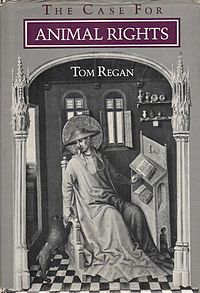The Case for Animal Rights

Cover of the first edition
|
|
| Author | Tom Regan |
|---|---|
| Country | United States |
| Subject | Animal rights, moral philosophy |
| Publisher | University of California Press |
|
Publication date
|
1983 |
| Pages | 474 (2004 paperback edition) |
| ISBN | |
| Preceded by | All That Dwell Therein: Essays on Animal Rights and Environmental Ethics |
| Followed by | Animal Sacrifices: Religious Perspectives on the Use of Animals in Science |
The Case for Animal Rights is a 1983 book by the American philosopher, Tom Regan, and an important text within animal rights theory. In the book, Regan argues that at least some kinds of non-human animals have moral rights because they are the "subjects-of-a-life," and that these rights adhere to them whether or not they are recognized.
Regan's position is Kantian (though Kant himself did not apply it to non-humans), namely that all subjects-of-a life possess inherent value and must be treated as ends-in-themselves, never as a means to an end. He also argues that, while being the subject-of-a-life is a sufficient condition for having intrinsic value, it is not a necessary one: an individual might not be the subject-of-a-life yet still possess intrinsic value.
The argument is a deontological one, as opposed to consequentialist. If an individual possesses a moral right, that right may not be sacrificed even if the consequences of doing so are appealing. He describes his "subject-of-a-life criterion" as follows:
[It] involves more than merely being alive and more than merely being conscious. ... individuals are subjects-of-a-life if they have beliefs and desires; perception, memory, and a sense of the future, including their own future; an emotional life together with feelings of pleasure and pain; preference- and welfare-interests; the ability to initiate action in pursuit of their desires and goals; a psychophysical identity over time; and an individual welfare in the sense that their experiential life fares well or ill for them, logically independently of their utility for others and logically independently of their being the object of anyone else's interests. Those who satisfy the subject-of-a-life criterion themselves have a distinctive kind of value – inherent value – and are not to be viewed or treated as mere receptacles."
Regan argues that normally mental mammals over a year old satisfy the conditions, including most human beings, with the possible exception of those in persistent vegetative states, as do several species of birds, and possibly fish. The key attribute is that – following Thomas Nagel's "What Is it Like to Be a Bat?" (1974) – there is something that it is like to be those individuals; they are the subjects of experience whose lives matter to them, even if they do not matter to anyone else.
...
Wikipedia
